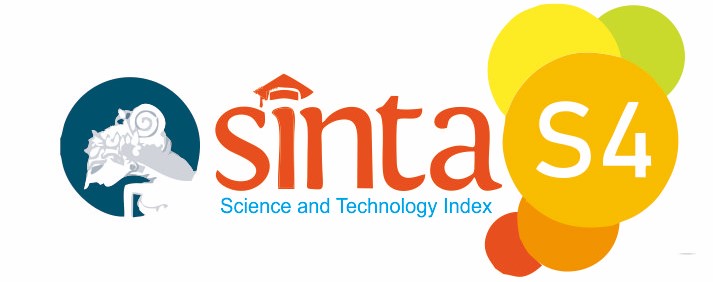PENGEMBANGAN PRAKTIKUM SAINS BERBASIS KEUNGGULAN LOKAL MELALUI PEMBUATAN PRODUK PANGAN RUMPUT LAUT
Abstract
Environmental based learning aims to improve students' cognitive abilities and skills. Local excellence-based on science practicums are able to apply their knowledge, to find ideas, and implement it to motivate students to study hard. Where the learning resources concrete and more contextual through the manufacture of seaweed food products starting from analysis, design, development, and implementation (sampling and preparation, sample processing, product assessment) have resulted in a deep student understanding of the material. Students have creative abilities (14.8%), taste (13.5%), aroma (13.8%), appearance (14.5%), texture (13.5%), nutritional diversity (14.2%), and hygiene (15.7%), with an average level of understanding and skill of students in each group of 88.3%. Based on the practicum of making seaweed food products, students will become more creative, innovative, skilled, and improve their cognitive abilities.
Full Text:
PDFReferences
Brederode, V. M. E., Zoon, A. S., & Meeter, M. (2020). Examining The Effect of Lab Instructions on Students’ Critical Thinking During A Chemical Inquiry Practical. Chemistry Education Research and Practice Journal, 21, 1173-1182.
Habibi. (2016). Pengembangan Strategi Pembelajaran IPA Kontekstual Berbasis Ekosistem Mangrove. Jurnal Lentera Sains (Lensa), 6 (2), 69-75.
Istiani, R. M., & Retnoningsih, A. (2015). Pemanfaatan Lingkungan Sekolah sebagai Sumber Belajar Menggunakan Metode Post To Post Pada Materi Klasifikasi Makhluk Hidup. Unnes Journal of Biology Education, 4 (1), 70-80.
Kahar, A. P. (2018). Penerapan Bahan Ajar Ekosistem Mangrove Berbasis Potensi Lokal untuk Meningkatkan Sikap Peduli Lingkungan Siswa. Didaktika Biologi: Jurnal Penelitian Pendidikan Biologi, 2 (1), 1-8.
Muchtar, Z., Rosalia, & Silaban, S. (2019). Implementation of Dubido Based on Contextual in Improving Students Achievement on Rate Reaction. Journal of Physics: Conference Series, 1462, 012053.
Pamungkas, S. J., Radian, M., & Fitrianti, A. R. (2020). Efektifitas Web CLME (Contextual Learning Mangrove Edutourism) untuk Mengembangkan Karakter Peduli Lingkungan Pada Siswa SMA. Lensa (Lentera Sains): Jurnal Pendidikan IPA, 10 (2), 172-186.
Ramdani, E. (2018). Model Pembelajaran Kontekstual Berbasis Kearifan Lokal Sebagai Penguatan Pendidikan Karakter. JUPIIS: Jurnal Pendidikan Ilmu-Ilmu Sosial, 10 (1), 1-10.
Santoso, E. (2017). Penggunaan Model Pembelajaran Kontekstual untuk Meningkatkan Kemampuan Pemahaman Matematika Siswa Sekolah Dasar. Jurnal Cakrawala Pendas, 3 (1), 16-29.
Saputri, D. N., Winarni, E. W., & Gunawan, A. (2020). Pengaruh Pemanfaatan Hutan Mangrove sebagai Sumber Belajar IPA Terhadap Sikap Peduli Lingkungan Siswa Kelas IV SD Kota Bengkulu. Jurnal Pendidikan Guru Sekolah Dasar, 12 (2), 150-158.
Sönmez, E., Memiş, E. K., & Yerlikaya, Z. (2019). The Effect of Practices Based On Argumentation - Based Inquiry Approach On Teacher Candidates’ Critical Thinking. Educational Studies Journal, 47, 1-25.
Tamu, Y., Utina, R., Nusantari, E., & Katili, A. S. (2017). Pengelolaan Ekosistem Pesisir Berbasis Sosiokultural dan Pendidikan Karakter Di Sekolah Dasar Menuju Kesejahteraan Alam Berkelanjutan. Islamic Review: Jurnal Riset dan Kajian Keislaman, 6 (2), 248-262.
Vachliotis, T., Salta, K., & Tzougraki C. (2021). Developing Basic Systems Thinking Skills for Deeper Understanding of Chemistry Concepts In High School Students. Thinking Skills and Creativity Journal, 41 (3), 1-35.
Winarni, E. W. (2016). The Influence of a “Natural Exploration”. Approach in Developing Environmental Attitudes and Understanding of 3R Principles for Primary School Students. Eco-thinking.
Zemel, Y., Shwartz, G., & Avargil, S. (2021). Preservice Teachers’ Enactment of Formative Assessment Using Rubrics in The Inquiry-Based Chemistry Laboratory. Chemistry Education Research and Practice Journal, 1-19.
Zubaidah, S. (2017). Pembelajaran Kontekstual Berbasis Pemecahan Masalah Untuk Mengembangkan Kemampuan Berpikir Kritis, Disampaikan pada Seminar Nasional Pendidikan Biologi (pp. 1-17), Makassar: Universitas Muhammadiyah.
DOI: http://dx.doi.org/10.24014/jcei.v4i1.35393
Refbacks
- There are currently no refbacks.

Journal of Chemistry Education and Integration
E-ISSN: 2829-1921 | P-ISSN: 2829-2774
Published By:
Department of Chemistry Education, Faculty of Tarbiyah and Teacher Training, Sultan Syarif Kasim State Islamic University, Riau
Mailing Address:
Jl. H.R Soebrantas Km. 15 No. 155 Kelurahan Simpang Baru Kecamatan Tuah Madani, Pekanbaru, Riau
email: jceipka@uin-suska.ac.id
Indexed By:
Journal of Chemistry Education and Integration is licensed under a Creative Commons Attribution 4.0 International License.






1.jpg)
.jpg)
.png)
.jpg)
.jpg)


